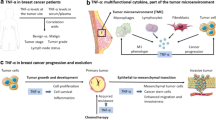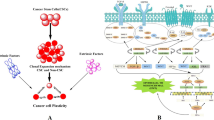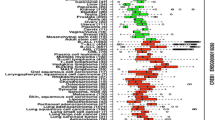Abstract
Prostate cancer progression is often accompanied by alterations of expression in one or more growth factor receptors and/or their ligands. This commentary examines the hypothesis that the disruption of the normal growth factor network itself is a critical event in prostate cancer progression. If such transition points are proven, there are significant ramifications.
Similar content being viewed by others
References
Maygarden SJ, Novotny DB, Moul JL, Bae VL, Ware JL: Evaluation of cathepsin D and epidermal growth factor receptor in prostate carcinoma. Mod Pathol 7: 930-936, 1994
Scher HI, Sarbis A, Reuter V, Cohen D, Netto G, Petrylak D, Lianes P, Funks Z, Mendelson J, Cordon-Cardo C: Changing pattern of expression of the epidemal growth factor receptor and transforming growth alpha in the progression prostatic of neoplasms. Clin Cancer Res 1: 545-550, 1995
Freeman MR, Paul S, Haefer M, Ishibawa M, Adam RM, Renshaw AA, Elenius K, Klagsbrun M: Heparin-binding EGF-like growth factor in the human prostate: Synthesis predominately by intestinal and vascular smooth muscle cells and action as a carcinoma cell mitogen. J Cell Biochem 68: 328-338, 1998
Cohen P, Peehl DM, Lamson G, Rosenfield RG: Insulin-like growth factors (IGF), IGF receptors and IGF binding proteins in primary cultures of prostate epithelial cells. Clin Endoc Metab 73: 401-407, 1991
Longo A, Gianni S, Natali A, Costanini A, Vannello GB, Serio M: Insulin-like growth factor-1 receptors in human hyperplastic prostate tissue: characterization, tissue localization, and their modulators by chronic treatment gonadotrophin-releasing analog. J Clin Endocrinol Metab 72: 240-246, 1991
Tennant M, Thrasher J, Twomey P, Drivdahl R, Birnbaum R, Plymate S: Protein and messenger ribonucleic (mRNA) for the type 1 insulin-like growth factor (IGF) receptor is decreased and IGF II mRNA is increased in human prostate carcinoma compared to benign prostate epithelium. J Clin Endocrin Metab 81: 3774-3782, 1996
Tennant M, Thrasher JB, Twomey PA, Bimbaum R, Plymate S: Insulin-like growth factor binding proteins (IGFBP)-4,-5,-6 in the benign and malignant human prostate: IGFBPS messenger ribonucleic acid localization differs fromIGFBP-5 protein localization. J Clin Endocrinol Metab 81: 3783-3792, 1996
Boudon C, Rodier G, Lechevallier E, Mottet N, Barenton N, Sultan C: Secretion of insulin-like growth factors and their binding proteins by human normal and hyperplastic prostatic cells in culture. J Clin Endocrinol Metab 81: 612-617, 1996
Plymate S, Hwa V, Thomasini C, Maddison L, Thrasher JB, Swisshelm K, Rosenfeld RG: Insulin-like growth factor binding protein 7 expression and regulation in the human prostate. Prog Endocrine Soc 1997, p 351 (abstract)
Ware JL, Strom SC, Maygarden SJ: Immunohistochemical evidence for expression of the c-erb B-2 protein in human prostatic carcinoma. Hum Pathol 22: 254-258, 1991
Kuhn EJ, Kurnot RA, Sesterhenn IA, Chang EH, Moul JW: Expression of the c-erb B2 (HER-2/neu) oncoprotein in human prostatic carcinoma. J Urol 150: 1427-1433, 1993
Yan G, Fukabori Y, Nikolaropuolos S, Wang F, McKeehan WL: Heparin-binding keritinocyte growth factor is a candidate stromal-to-epithelial andromedin. Mol Endocrinol 6: 2123-8, 1992
Ropiquet F, Berthon P, Villette JM, LeBrun G, Maitland NJ, Cussenot O, Fiet J: Constitutive expression of FGF2/bFGF in non-tumorgenetic human prostatic epithelial cells results in the acquisition of a partial neoplastic phenotype. Int J Cancer 72: 543-7, 1997
Kim IY, Ahn HJ, Shaw JW, Lang S, Kato M, Oefelein MG, Miyazara K, Nemeth JA, Kozlowski JM, Lee C: Loss of expression of transforming growth factor beta type I and type II receptors correlates with tumor grade in human prostate cancer tissues. Clin Cancer Res 2: 1255-1261, 1996
Guo Y, Kyprianov N: Overexpression of transforming growth factor (TGF) beta type II receptor restores TGF beta sensitivity and signaling in human prostate cancer cells. Cell Growth Differ 9: 185-93, 1998
Peusner L: Studies in Network Thermodynamics. Elsevier Publishing, Amsterdam, 1986
Mikalecky DC: A comparison between the formal description of reaction and neural networks: A network thermodynamic approach. In: Mikalecky DC, Clarke AM (ed) Biomedical Engineering: Opening New Doors, New York University Press, New York, 1990, pp 67-74
Hopfield JJ, Tanks DW: Computing with neural circuits: a model. Science 233: 625-633, 1986
Elson SD, Browne CA, Thorburn GG: Identification of epidermal growth factor-like activity in human male reproductive tissue and fluids. J Clin Endocrinol Metab 48: 673-679, 1984
Moul JW, Maygarden SJ, Ware JL, Mohler JL, Maher PD, Schenkman NS, Ho CK: Cathepsin D and epidermal growth factor receptors (EGFR) immunohistochemistry does not predict outcome of prostate cancer patients undergoing radical prostatetectomy. J Urol 155: 982-985, 1996
Robinson D, Feng H, Pretlow T, Kung HJ: A tyrosine kinase profile of a prostate carcinoma. Proc Nat Acad Sci USA 93: 5958-5962, 1996
Fong CJ, Sherwood ER, Mendleson J, Lee C, Kozlowski JM: Epidermal growth factor receptor monoclonal antibody inhibits constitutive receptor phosphorylation, reduces autonomous growth, and sensitized androgen-independent prostatic carcinoma cells to tumor neurosis factor α. Cancer Res 52: 5887-5892, 1992
Ching KZ, Ramsay CE, Pethgrew N, Cunha RH, Jason M, Dodd JG: Expression of mRNA for epidermal growth factor, transforming growth factor alpha, and their receptor in human prostate tissue and cell lines. Mol Cell Biochem 126: 151-158, 1993
Bae VL, Jackson-Cook CK, Brothman AR, Maygarden SJ, Ware JL: Tumorigeniaty of SV40T antigen immortalized human prostate epithelial cells: association with decreased epidermal growth factor receptor (EGFR) expression. Int J Cancer 58: 721-729, 1994
Angellon-Nicoud P, Benoux M: Autocrine regulation of cell proliferation by the insulin-like growth factor (IGF) and IFG-binding protein-3 protease system in a human prostate carcinoma cell line (PC-3). Endocrinol 136: 5485-5492, 1995
Pietizkowski Z, Mulholland G, Gomella L, Jameson B, Wermicle D, Baserga R: Inhibition of growth of prostatic cancer cell lines by peptide analogues of insulin-like growth factor 1. Cancer Res 53: 1102-1106, 1993
Jackson-Cook C, Bae V, Edelman W, Brothman A, Ware J: Cytogenetic characterization of the human prostate cancer cell line P69SV40T and its novel tumorgenic sublines M2182 and M15. Cancer Genet Cytogenet 87: 14-23, 1996
Bae VL, Jackson-Cook CK, Maygarden SJ, Plymate S, Chen J, Ware JL: Metastatic sublines of an SV40 large T antigen immortalized human prostate epithelial cell line. Prostate 34: 275-282, 1998
Watson BW, Ware JL, Ferreira-Gonzalez A, Wilkinson DS, Garrett CT: Identification of subchromosomal regions associated with phenotypic changes in a human prostate cancer model using microsatellite loss of heterozygosity (LOH) analysis. Proc Am Assoc Cancer Res 39: 342 (Abstract 2 339), 1998
Plymate SR, Bae VL, Maddison L, Quinn LS, Ware JL: Re-expression of the type 1 IGF receptor (IGF-IR) inhibits the malignant phenotype of SV40 T-immortalized human prostate epithelial cells. Endocrinol 138: 1728-1735, 1997
Damon SE, Maddison L, Ware JL and Plymate SR: Overexpression of an inhibitory insulin-like growth factor binding protein (IGFBP), IGFBP-4, delays onset of prostatic tumor formation. Endocrinol 139: 3456-3464, 1998
Webber MM, Bello D, Quader S: Immortalized and tumorgenic adult human prostatic epithelial cell lines: characteristics and applications. Part 2. Tumorgenic cell lines. Prostate 30: 58-64, 1997
Niederberger C: Computational tools for the modern andrologist. J Androl 17: 462-466, 1996
Prideaux JA, Mikulecky DC, Clarke AM, Ware JL: A modified neural network model of tumor cell interactions and sub-population dynamics. Invasion Metastasis 13: 50-56, 1993
Miles BJ, Katlan MW: Computer modeling of prostate cancer treatment. A paradigm for oncologic management. Surg Oncol Clin N Am 4: 361-372, 1995
Tewan A, Narayan P: Novel staging for localized prostate cancer: a pilot study using genetic adaptive neural networks. J Urol 160: 430-436, 1998
Douglas TH, Moul JW: Applications of neural networks in urologic oncology. Semin Urol Oncol 16: 35-39, 1998
Vawer A, Rashbass J: The biological toolbox: a computer program for simulating basic biological and pathological processes. Comput Meth Programs Biomed 52: 203-211, 1997
Haas GP, Sakr W: Epidemiology of prostate cancer. CA 47: 273-287, 1997
Author information
Authors and Affiliations
Rights and permissions
About this article
Cite this article
Ware, J.L. Growth Factor Network Disruption in Prostate Cancer Progression. Cancer Metastasis Rev 17, 443–447 (1998). https://doi.org/10.1023/A:1006114527274
Issue Date:
DOI: https://doi.org/10.1023/A:1006114527274




